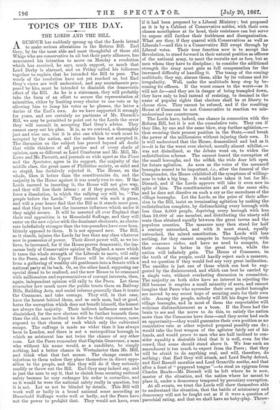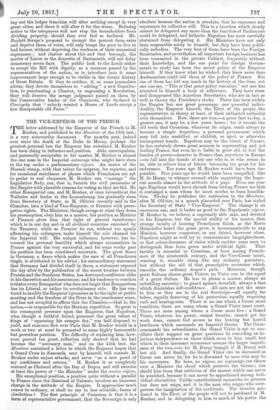TOPICS OF THE DAY.
THE LORDS AND THE BILL.
ARUMOUR has suddenly sprung up that the Lords intend to make serious alterations in the Reform Bill. Earl Grey, by far the most able and most thoughtful of those old Whigs who are conservative in all but their party alliances, has announced his intention to move on Monday a resolution which has received, he says, much support, so much that Lord Derby is alarmed, and on Friday called his followers together to explain that he intended the Bill to pass. The words of the resolution have not yet reached us, but Earl Grey's views are well understood, and any amendments pro- posed by him must be intended to diminish the democratic effect of the Bill. As he is a statesman, they will probably take the form of an effort to secure the representation of minorities, either by limiting every elector to one vote or by allowing him to lump his votes as he pleases, the latter a device of the Earl's own. As we have supported it strongly for years, and are certainly no partizans of Mr. Disraeli's Bill, we may be permitted to point out to the Lords the error they will commit in accepting Earl Grey's advice. They cannot carry out his plan. It is, as we contend, a thoroughly just and wise one, but it is also one which to work must be accepted by the nation, and the nation has not accepted it. The discussion on the subject has proved beyond all doubt that while thinkers of all parties and of every shade of opinion, men so different as Lord Cranborne and Mr. Mill, Mr. Lowe and Mr. Fawcett, and journals so wide apart as the Times and the Spectator, agree in its support, the majority of the middle class, the great mass of Philistine society, so solid and so stupid, has decisively rejected it. The House, on the whole, likes it better than the constituencies do, and the majority in the House against it was nearly two to one. If the Lords succeed in inserting it, the House will not give way, and they will lose their labour ; or if they persist, they will force a dissolution, in which the rallying cry will be, "The people before the Lords." They cannot win such a game, and will a year hence find that the Bill as it stands must pass, and that they have lost the immense influence which under it they might secure. It will be asserted all over England that their real opposition is to Household Suffrage, and they will enter on the new regime with the dominant electorate, an electo- rate indefinitely stronger than the ten-pounders have ever been, bitterly opposed to them. It is not opposed now. The Bill, as it stands, injures the Lords far less than any class whatever now in possession of power. Their direct power will, as we be- lieve, be increased, for if the House proves democratic, the im- mense body of Conservative opinion in England, a mass which it taxes the whole strength of the Liberals to move, will rally to the Peers, and the Upper House will be changed at once from a gathering of wealthy old gentlemen into a Senate with a national party at its back. Or, on the other hand, supposing our special dread to be realized, and the new House to be crammed with millionaires and representatives of corrupt interests, then, again, independent opinion will rally to the Peers. Let them remember how much more the public trusts them on Railway Bills, Building Acts, and social reforms generally than it trusts the Commons, and take courage. They will, in that case, have the honest behind them, and as each man, bad or good, hates the corruption which does not benefit himself, the honest are always the majority. Their indirect influence cannot be diminished, for the new electors will be further beneath them than the old, more inclined to defer to their experience, more exposed to that charm of rank which only the cultivated escape. The suffrage is made no wider than it has always been in London, and there is not a metropolitan borough in which an aristocrat has not twice the chance of any other man. Let the Peers remember that Captain Grosvenor, a man who without his name would, as a candidate, be simply nothing, had a better chance in Westminster than Mr. Mill, and think what that fact means. The change cannot be injurious to them unless they place themselves in direct oppo- sition to the people, and this they will do if they seriously modify or throw out the Bill. Earl Grey may indeed say, and is just the man to say it, that to shrink from securing national safety because he may endanger his order is cowardice, and so it would be were the national safety really in question, but it is not. Let us not be blinded by details. This Bill will work well or badly in a broad national sense according as Household Suffrage works well or badly, and the Peers have not the power to prohibit that. They would not have, even if it had been proposed by a Liberal Ministry ; but proposed as it is by a Cabinet of Conservative nobles, with their own: chosen mouthpiece at its head, their resistance can but serve' to expose still further their feebleness and disorganization. What are they, if they quarrel with Conservatives as well as Liberals ?—and this is a Conservative Bill swept through by Liberal votes. Their true function now is to accept the Revolution, to stand forward in their natural position as officers, of the national army, to meet the recruits not as foes, but as men whom they have to discipline ; to consider the additional strength the army must gain as full compensation for the increased difficulty of handling it. The tramp of the coming multitude, they say, alarms them, alike by its volume and its irregularity. Well, make the multitude keep step by be- coming its officers. If the worst comes to the worst—as it will not do—and they are in danger of being trampled downy they have only to lead instead of resisting, to demand in the name of popular rights that electors shall be at liberty to choose them. They cannot be refused, and if the resulting House of Commons be not Conservative to reaction we mis- understand our countrymen.
The Lords have, indeed, one chance in connection with the Reform Bill, but it is not the cumulative vote. They can if they like, by one and the same blow, stop further agitation,— thus securing their present position in the State,—and break the power of the millionaires without injuring their own. It is well understood that the House, demoralized and bad as it is—it is far the worst ever elected, morally .almost nihilist,— was not disinclined, as the debate went on, to widen the redistribution scheme. The earnest feared the corruption of the small boroughs, and the selfish the wide door left open for future agitation. As soon as the votes of the menace& boroughs ceased to be important, i.e., after the funeral of the Compounder, the House exhibited all the symptoms of willing- ness to take a big leap. It would have taken it but for Mr. Disraeli, and if the Lords approve will take it even now in spite of him. The constituencies are all on the same side; and he dare not dissolve on such a cry as the sacredness of the village boroughs. Let the Lords, as the price of their adhe- sion to the Bill, insist on terminating agitation by making the redistribution complete, by disfranchising every borough with less than 8,000 people, depriving every borough with less. than 10,000 of one member, and distributing the ninety odd. seats thus obtained equally between the great towns and the populous counties. The measure may then stand for half a century untouched, and with it must stand, equally- untouched, the mixed constitution. The Lords will lose nothing, for they cannot compete in borough-buying with, the nouveaux riches, and have no need to compete, for- their chance is better in the great towns, while the nation will infinitely gain. The House of Commons, in the teeth of the people, could hardly reject such a measure, and we question if they would feel any very great inclination.. The sacrifice is just one of those which can best be sug- gested by the disinterested, and which can best be carried by- a single vote, without everlasting discussion in committee.. The majority on both sides have no interest in rejecting the Bill because it empties a small minority of seats, and cannot imagine that Peers who surrender their own pocket boroughs. are moved by any secret hope of securing seats for their own side. Among the people, nobody will lift his finger for these- village boroughs, and in most of them the respectables will welcome disfranchisement as a boon. If the Peers had the brain to see and the nerve to do this, to satisfy the nation more than the Commons have done—and they never had such an opportunity—they would guarantee their own position as no- cumulative vote or other rejected proposal possibly can do ; would take the best weapon of the agitator fairly out of his. hands, and would prove to men who are half inclined to con- sider equality a desirable ideal that it is well, even for the crowd, that some should stand above it. We fear such an amendment is too much to expect from the Peers; that they will be afraid to do anything real, and will, therefore, do nothing ; that Earl Grey will attack, and Lord Derby defend, and Earl Russell moralize and Lord Granville soothe, and that after a feast of "peppered tongue "—to steal an epigram from Charles Reade—Mr. Disraeli will be left where he is now, master of the situation, and the nation where he meant to place it, under a democracy tempered by pecuniary corruption. At all events, we trust the Lords will show themselves able to understand the situation, that the battle of aristocracy and democracy will not be fought out as if it were a question of parochial rating, and that we shall have no baby-play. Throw- lag out the lodger franchise will alter nothing except in very great cities, and there it will alter it for the worse. Refusing notice to the ratepayers will not stop the householders from dividing property, should they ever feel so inclined. Mr. Youlett Scrope's proposal to exempt the poorest from rates and deprive them of votes, will only tempt the poor to live in bad houses, without depriving the workmen of their numerical . -supremacy and chatter about this and that borough, the merits of Luton or the demerits of Dartmouth, will not delay democracy seven days. The public look to the Lords either to accept the Bill with dignity, as a measure passed by the representatives of the nation, or to introduce into it some improvement large enough to be visible in the future history of Great Britain. If they do neither, if, as some journalists advise, they devote themselves to "editing " a new Constitu- tion, to punctuating a Charter, to engrossing a Revolution, they will deserve the savage judgment passed on them by the Conservative leader of the Commons, who declared in Coningsby that "nobody wanted a House of Lords except a few disreputable old Peers."































 Previous page
Previous page